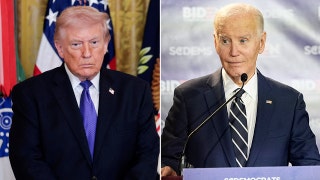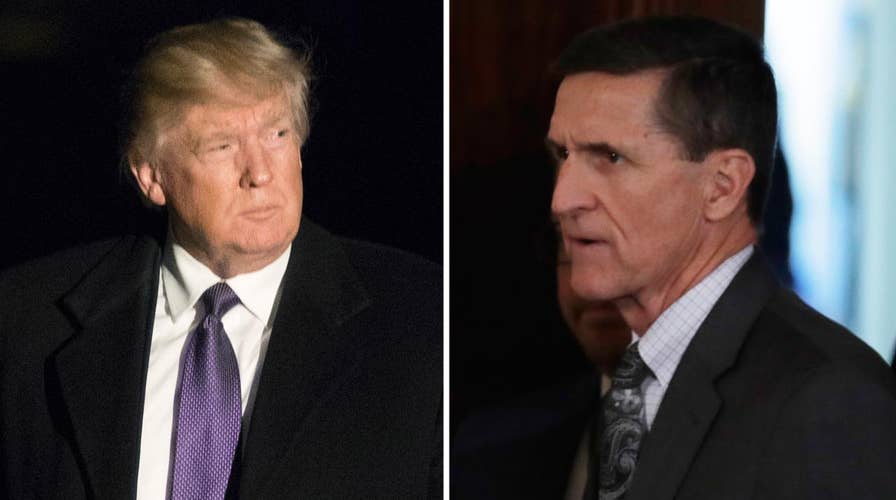President Trump 'evaluating' Gen. Flynn situation
National security adviser apologizes to Vice President Pence about contact with Russia; Jennifer Griffin reports on 'Special Report'
WASHINGTON – The Justice Department warned the Trump administration about embattled national security adviser Michael Flynn's contacts with Russia, two people with knowledge of the situation told The Associated Press on Monday night.
One of the people said the Justice Department alerted the White House that there was a discrepancy between what officials were saying publicly about the contacts and the facts of what had occurred. The person said the Justice Department was concerned Flynn could be in a compromised position.
A Trump administration official said the White House has been aware of the Justice Department warning for "weeks." The official would not say if the president had been briefed on the matter.
Both people insisted on anonymity to discuss the matter. The Washington Post first reported the communications with the Justice Department.
The White House earlier said President Donald Trump was "evaluating the situation" regarding Flynn's conversations with Russia's ambassador to the U.S., deepening the uncertainty surrounding Flynn's future in the new administration.
Flynn apologized privately for the controversy to Vice President Mike Pence, according to a White House official. Pence, relying on information from Flynn, publicly vouched that the retired Army lieutenant general did not discuss U.S. sanctions against Russia in calls late last year. Flynn has since told the White House that sanctions may have come up.
White House spokesman Sean Spicer said Trump was consulting with Pence about his conversations with the national security adviser. Asked whether the president had been aware that Flynn might discuss sanctions with the Russian envoy, Spicer said, "No, absolutely not."
Trump, who comments on a steady stream of issues on his Twitter feed, has been conspicuously silent about the matter since The Washington Post reported last week that Flynn had discussed sanctions with the Russian envoy. A U.S. official told The Associated Press that Flynn was in frequent contact with Ambassador Sergey Kislyak on the day the Obama administration slapped sanctions on Russia for election-related hacking, as well as at other times during the transition.
Earlier Monday, White House counselor Kellyanne Conway said Trump had "full confidence" in Flynn, though her assertions were not backed up by other senior Trump aides. Spicer would say only that Flynn was continuing to carry out "his daily functions."
The conflicting signals created confusion at the White House, with reporters crowding around Spicer's office for hours Monday afternoon seeking information on Flynn's future.
Several House Democrats called on Oversight Committee Chairman Jason Chaffetz, R-Utah, to launch an investigation into Flynn's ties to Russia. House Democratic leader Nancy Pelosi called for Flynn to be fired, saying he "cannot be trusted not to put Putin before America."
Republican Sen. Susan Collins, R-Maine, said that if Pence were misled, "I can't imagine he would have trust in Gen. Flynn going forward." She said it would also be "troubling" if Flynn had been negotiating with a foreign government before taking office.
It's illegal for private citizens to conduct U.S. diplomacy. Flynn's conversations also raise questions about Trump's friendly posture toward Russia after U.S. intelligence agencies concluded that Moscow hacked Democratic emails during the election.
The controversy comes as Trump and his top advisers seek to steady the White House after a rocky start. The president, who seeks input from a wide range of business associates, friends and colleagues, has been asking people their opinions on his senior team, including Spicer and chief of staff Reince Priebus.
Advisers have privately conceded that the White House spit out too many disparate messages in the first few weeks, though they also note that the president's own tweets sometimes muddy the day's plans before most of the White House staff has arrived for work.
Trump voiced support for Priebus Monday, saying the chief of staff was doing, "not a good job, a great job." But he did not make a similar show of support for his national security adviser.
Flynn sat in the front row of Trump's news conference with Canadian Prime Minister Justin Trudeau earlier Monday. The president did not receive a question about Flynn's future from a pair of reporters, and he ignored journalists' shouted follow-up inquiries as he left the room.
Over the weekend, Trump told associates he was troubled by the situation, but did not say whether he planned to ask Flynn to step down, according to a person who spoke with him recently. Flynn was a loyal Trump supporter during the campaign, but he is viewed skeptically by some in the administration's national security circles, in part because of his ties to Russia.
In 2015, Flynn was paid to attend a gala dinner for Russia Today, a Kremlin-backed television station, and sat next to Russian President Vladimir Putin during the event.
Flynn spoke with the vice president about the matter twice on Friday, according to an administration official. The official said Pence was relying on information from Flynn when he went on television and denied that sanctions were discussed with Kislyak.
The administration officials and those who spoke with the president recently were not authorized to discuss the matter publicly and insisted on anonymity.













































